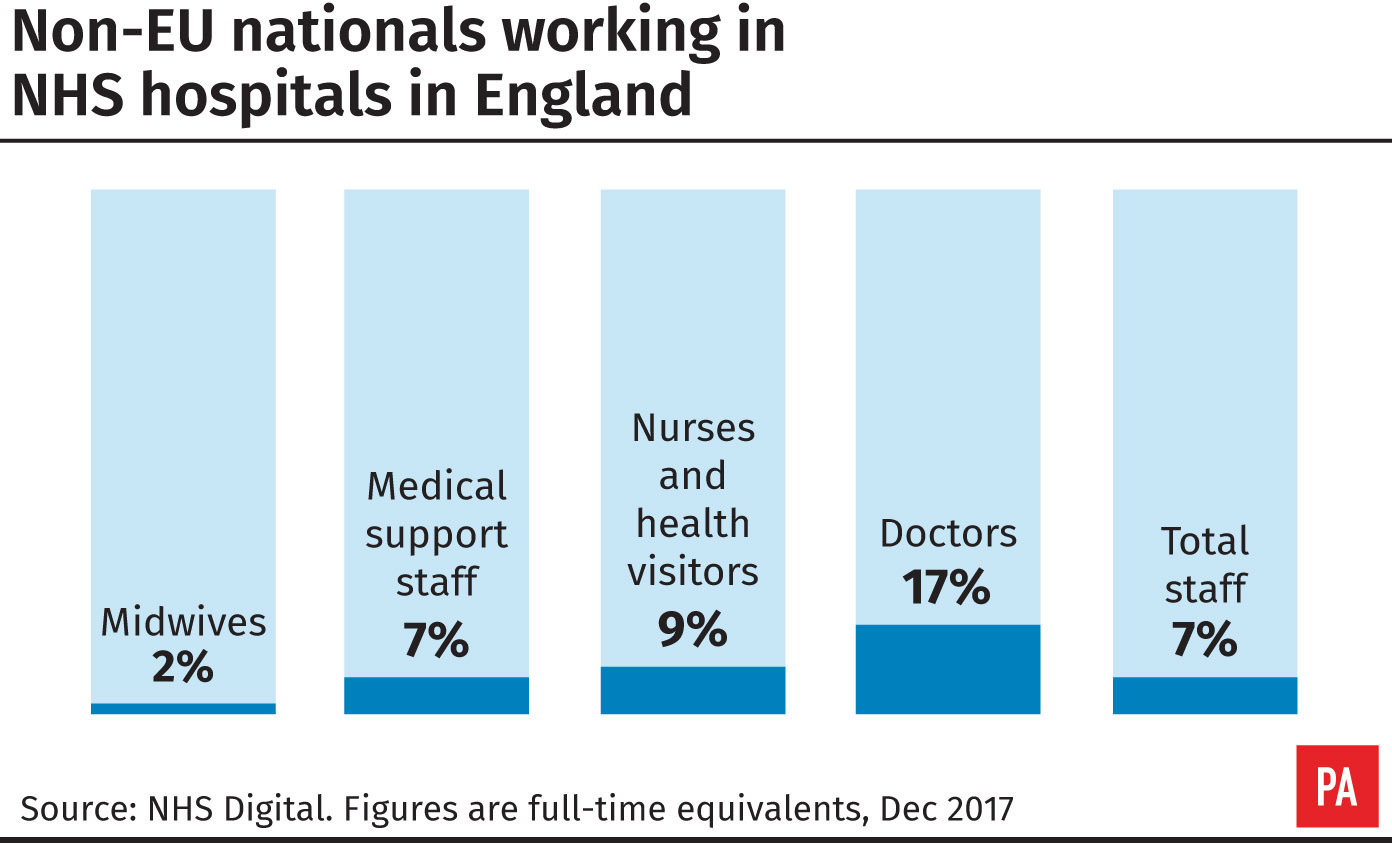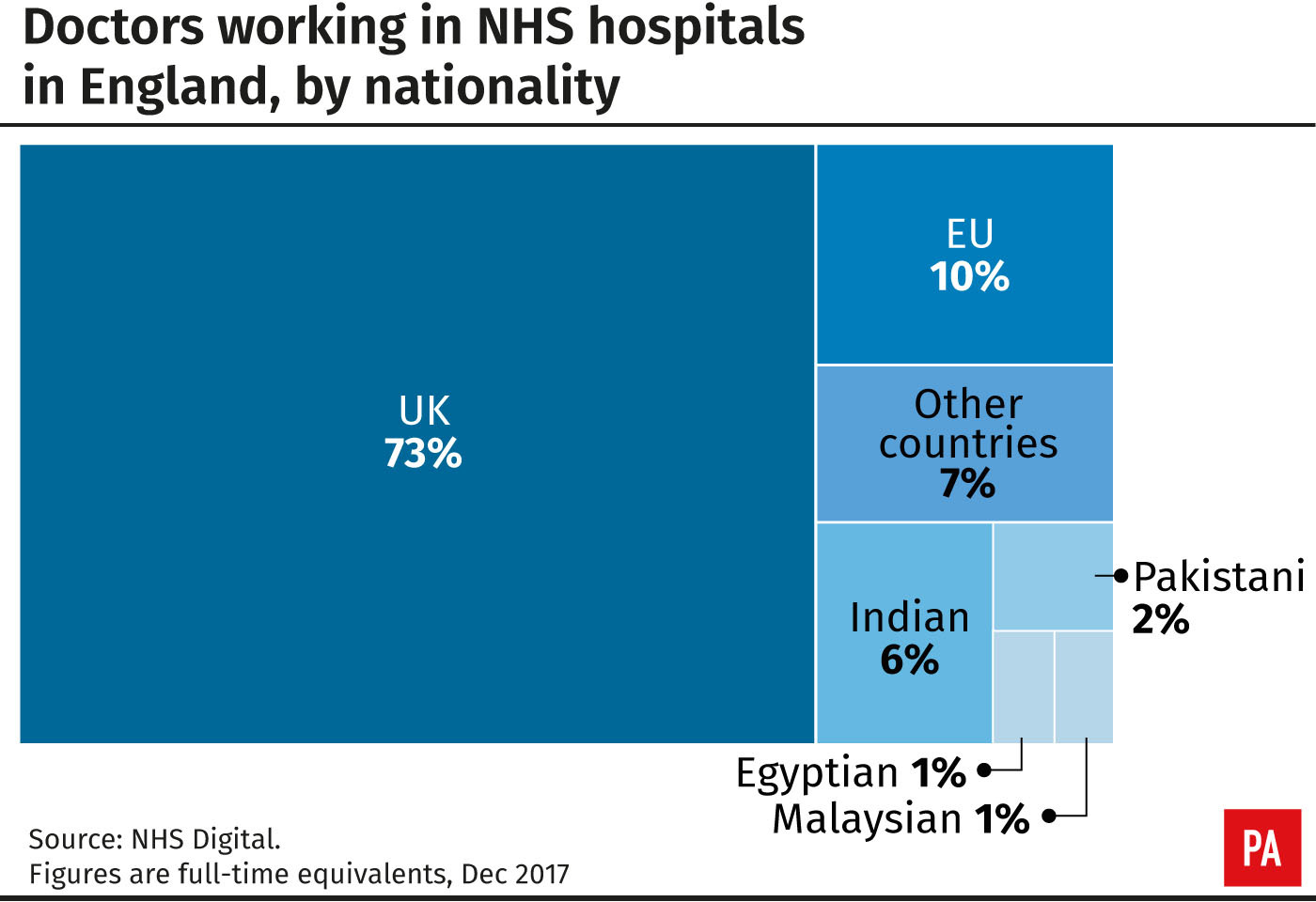
Understaffed health trusts are being forced to pay premium rates for locum doctors because immigration rules are preventing doctors from overseas coming to Britain to work, health chiefs have warned.
Limits on the number of visas issued to doctors from countries outside the European Economic Area are contributing to rota gaps and delays in patients receiving care, they have said.
NHS Employers said there have been 400 cases of blocked visas since December.

The Home Office said its limits are in the national interest.
Workforce policy adviser at NHS Providers, Paul Myatt, said doctors unable to get visas may give up on trying to work for the NHS and go to work in another country.
“Faced with shortages of doctors, recruiting internationally is one of the few options available to trusts in the short-term,” he said.
“It’s deeply frustrating for trusts and doctors that when a job offer has been made, after considerable time and expense, trusts are repeatedly being declined the certificates of sponsorship needed for doctors to get work visas.
“For the trust it means unfilled vacancies which often have to be filled by paying premium locum rates. For doctors, they may give up on working in the NHS and decide to work in another country.
“We appreciate that discussions are taking place within Government about this issue, but there needs to be a new sense of urgency to find a solution so that trusts can recruit the staff they need to care for patients.”

In February NHS Improvement said that there were 100,000 vacancies across England’s 234 acute, ambulance and mental health trusts.
The chief executive of NHS Employers, Danny Mortimer, told the BBC: “We have examples of clinics being cancelled and delays in terms of patients receiving care.
“It exacerbates pressures in what are relatively small medical teams.”
Some 100 visas are reported to have been refused for a scheme in the North West that supplies junior doctors to 30 NHS trusts.
Bosses are said to have written to Health Secretary Jeremy Hunt and Home Secretary Amber Rudd with their concerns.
Chief officer of the Greater Manchester Health and Social Care Partnership, Jon Rouse, said: “As we reach the end of a winter where the NHS has been stretched to its very limits, partly as a result of a lack of medical workforce, we find it almost impossible to understand how this decision can have been reached.”
Doctors are classed as Tier 2 visa applicants by the Home Office.
A Home Office spokeswoman told the BBC any applications refused in over-subscribed months can be applied for again in future ones.
Mr Mortimer added: “NHS organisations have been unable to obtain the required permits for months for essential medical colleagues, and we have called on the Government to urgently address this serious problem.
“We are aware of at least 400 doctors who haven’t been able to enter the country to take up posts.
“This prolonged inability to recruit non-EEA talent hits us particularly hard – and therefore hits patients hard too. We are also aware that our overall demand for visas within the present Tier 2 system is adversely impacting on other parts of the economy.
“We have proposed removing shortage occupation list roles from the cap but await a response from the Government.”
Think tank British Future suggested visa applications from the NHS for highly-skilled non-EU migrants should be excluded from the Tier 2 quota.
Director Sunder Katwala said: “Britain shouldn’t be turning away doctors and nurses from outside the EU that the NHS needs and the public would welcome.
“This has now been going on months and NHS trusts have clearly had enough. The public will be entirely on their side.
“Right now, this is one problem that the Home Secretary can fix quite easily. With our health service short on high-skilled staff, it makes sense to take NHS staff out of the monthly high-skilled quota.”
A Downing Street spokesman said: “We estimate that around one third of all Tier 2 places go to the NHS.
“We need to have a system which ensures the NHS gets the staff it needs. That’s why we are investing in the workforce and we have record numbers working in the health service.”


Comments: Our rules
We want our comments to be a lively and valuable part of our community - a place where readers can debate and engage with the most important local issues. The ability to comment on our stories is a privilege, not a right, however, and that privilege may be withdrawn if it is abused or misused.
Please report any comments that break our rules.
Read the rules hereLast Updated:
Report this comment Cancel